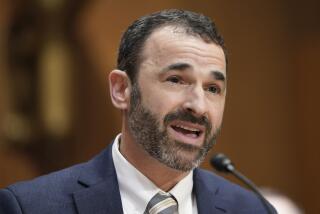Claiming Kids? IRS Wants Some Proof
- Share via
Got kids? If you’re using them to claim a tax break targeted for the working poor, the Internal Revenue Service may soon ask you to prove it.
In the first step of a widely anticipated crackdown on errors and cheating involving the earned income tax credit, the Internal Revenue Service said Friday that it would ask 45,000 low-income taxpayers -- mainly single dads and non-parental caregivers -- to “pre-certify” that the children they intend to claim on their tax forms next year lived with them for at least six months of 2003.
This residency test is required to claim the earned income tax credit, which can provide thousands of dollars in tax refunds to poor, working families.
This residency test is not required to claim a child as a dependent.
Taxpayers tapped by the EITC pilot program will be expected to provide school or child-care records, as well as affidavits from doctors, ministers, landlords or property managers. They’ll also be required to complete a new tax form -- Form 8836 -- to pre-certify the child’s residency before the child is used to claim the earned income tax credit on 2003 returns.
The IRS is encouraging all those who receive the forms to fill them out before January. If they do, EITC refunds will be prompt, the agency promised. On the other hand, if contacted taxpayers wait to file the form and ancillary documents with their tax returns, the EITC portion of their refund will be delayed “until the residency documentation is processed.” The agency did not say how long that might take.
“The whole reason that we want to go to pre-certification is that, if this works, we will be able to make the audit rate in the EITC program drop dramatically,” said John Dalrymple, IRS deputy commissioner for operations support.
The earned income tax credit accounts for nearly half of the individual taxpayers who are audited. About 7% of these audits take more than a year, during which time the EITC claims are frozen, the agency said.
The audit rate is high because Congress ordered the IRS to scrutinize the program, which is believed responsible for about $8 billion to $10 billion in unwarranted refunds, agency officials said.
Next year, the agency expects to launch a second pre-certification program that will require individuals who may be understating income or misrepresenting their marital status in order to claim the earned income tax credit to prove their claims. The IRS hasn’t worked out details of how this will be done.
The IRS also pledged Friday to cut the EITC audit backlog and work on outreach and communication efforts so that low-income taxpayers who are audited aren’t “completely stupefied” about how to respond to IRS notices, Dalrymple said. The details of that effort also are under consideration. In the meantime, the agency has opened the topic to public comment.
Interested parties can submit comments electronically to notice.comments@irscounsel .treas.gov or in writing to P.O. Box 7604, Ben Franklin Station, Washington, D.C. 20044.
More to Read
Inside the business of entertainment
The Wide Shot brings you news, analysis and insights on everything from streaming wars to production — and what it all means for the future.
You may occasionally receive promotional content from the Los Angeles Times.










